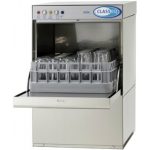

Things to Know About Commercial Glass Washers
Providing customers with clean glasses is essential for any catering business. Therefore, it's important that you choose the correct commercial glass washer to meet your company's needs. If you're unsure about what you're after, we've compiled this handy guide to glass washers and their uses.
Differences between commercial and domestic washers
As they run on shorter cycles, commercial washers have to employ more aggressive detergents than the ones we are used to at home. Glass washing machines can't use high water pressure as it would damage the glasses, so they are built differently from other washers. As commercial washers tend to be used much more frequently than domestic ones, you will need to consider the energy and water usage of your machine in order to save on cost.
Most common glass washers
Undercounter: Similar to residential models, these washers sit under a counter and can usually handle as many as 35 racks per hour. They use a built-in heating element to douse glasses in 80-degree Celsius heat for sanitisation.
In-sink glass washers: Used mainly for quick washes, these washers fit into the sink and include a rotating brush that is set in hot water to scrub dirty glasses.
Conveyor: Perfect for high-volume applications, these washers can process more than 400 racks per hour.

Most common accessories
Drainage pumps: Often these pumps are incorporated into the design of a dishwasher, but in some cases, they are not included. They are used to quickly drain the machine between washes. You will need to check before buying a dishwasher to see if they included a built-in or external drainage pump.
Booster heaters: These heaters are used to pre-heat water to the required 80-degree Celsius for proper sanitisation. These operate independently from the washer to ensure that enough water reaches the correct heat to wash the glasses. Most undercounter and door units have a built-in booster heater, but you will need to check this before purchase.
Detergent
Most commercial glass washers dispense the correct amount of detergent for each cycle as part of the washing process, however some do not. Some machines don't come with built-in reservoirs for the chemicals. Instead, they rely on an external tube system with bottles sitting to the side of the machine.
Stands and Racks
Most machines are only supplied with one or two racks for stacking glasses. If you require more, you will need to purchase them separately, ensuring they are the correct fit for your machine.
Location
For your commercial dishwasher to function, you will need to have electricity and water supplies within two meters of the machine. If these supplies are not available in your proposed location, you may need to budget for the work to be done.
With all this in mind, picking the right glass washer should help with the day-to-day running of your business significantly, making life easier for your staff and providing your customers with gleaming glassware every time.


Validate your login
Login
Create New Account